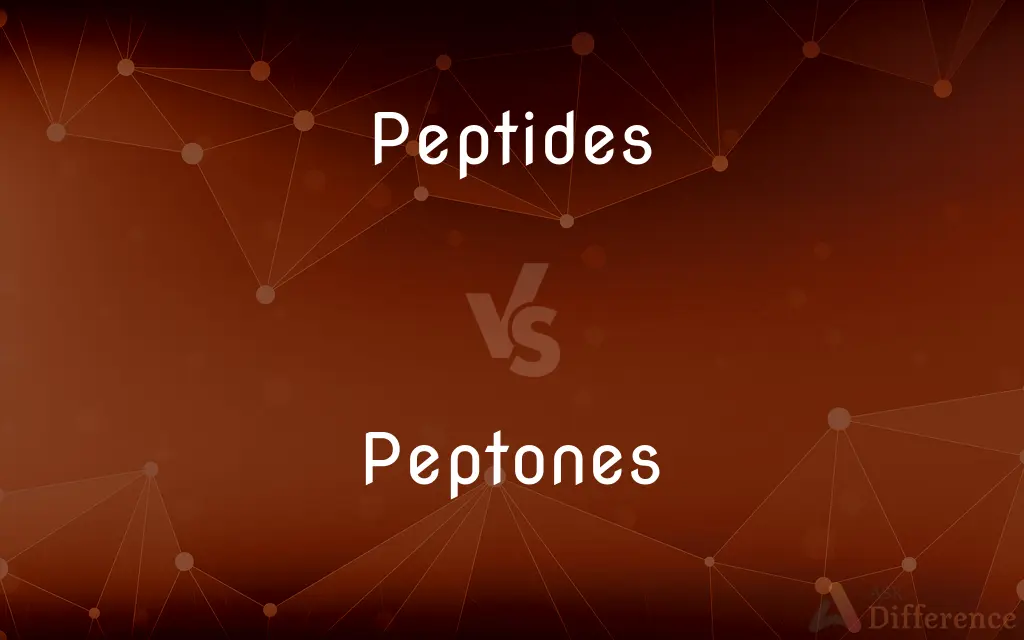Peptides vs. Peptones — What's the Difference?
By Tayyaba Rehman — Published on November 1, 2023
Peptides are short chains of amino acids, while peptones are partially digested proteins used in microbiology.

Difference Between Peptides and Peptones
Table of Contents
ADVERTISEMENT
Key Differences
Peptides are sequences of amino acids linked by peptide bonds, which are crucial in biological functions. Peptones, on the other hand, result from the hydrolysis of proteins and serve as a nutrient source in culture media.
Peptides can vary in length, from two amino acids (dipeptides) to much longer chains, but are generally shorter than proteins. Peptones are typically the product of enzymatic breakdown, often derived from animal proteins or plants.
The main role of peptides in the body includes hormone production, cellular function, and as building blocks for proteins. Peptones, however, are predominantly utilized in microbiological laboratories to nourish and cultivate bacteria.
Peptides are essential for various therapeutic and cosmetic products due to their functional properties. Peptones, on the other hand, play an indispensable role in scientific research, ensuring the growth of microorganisms.
Structurally, peptides are defined by their specific sequence of amino acids. Peptones lack such specific structure, being a mix of various peptides and amino acids resulting from protein breakdown.
ADVERTISEMENT
Comparison Chart
Nature
Short chains of amino acids
Partially digested proteins
Function
Biological functions like hormone production
Nourishment in culture media
Usage
Therapeutic and cosmetic products
Microbiological research
Structure
Defined by specific amino acid sequences
Mixture of peptides and amino acids
Origin
Naturally occurring in body or synthesized
Result of enzymatic protein hydrolysis
Compare with Definitions
Peptides
Peptides can function as hormones, signaling molecules, or therapeutics.
Certain peptides can stimulate collagen production in the skin.
Peptones
They serve as nutrient sources in microbial culture media.
Peptones provide essential amino acids for bacterial growth.
Peptides
They are smaller than proteins and can have varied lengths.
The peptide oxytocin has nine amino acids.
Peptones
Peptones are products of protein hydrolysis.
Bacterial growth is enhanced when peptones are added to the culture medium.
Peptides
Peptides are chains of amino acids linked by peptide bonds.
Insulin, a hormone, is an example of a peptide.
Peptones
Peptones are derived from plant or animal sources.
Soy peptones are derived from soy protein hydrolysis.
Peptides
Peptides can be natural or synthetically produced.
Many skincare products contain synthetic peptides to improve skin health.
Peptones
Peptones are important in microbiology for cultivating bacteria.
To ensure consistent bacterial growth, a specific amount of peptones is added to the medium.
Peptides
Some peptides act as neurotransmitters or inhibitors.
Endorphins, natural pain-relieving peptides, are released during exercise.
Peptones
They lack a specific amino acid sequence.
Unlike peptides, peptones are a mix of amino acids and smaller peptides.
Peptides
Any of various natural or synthetic compounds containing two or more amino acids joined by peptide bonds that link the carboxyl group of one amino acid to the amino group of another.
Peptones
Any of various water-soluble protein derivatives formed by partial hydrolysis or digestion of proteins by an acid or enzyme, used in culture media in bacteriology.
Peptides
Plural of peptide
Peptones
Plural of peptone
Common Curiosities
How are peptides different from proteins?
Peptides are smaller in size compared to proteins, typically having fewer amino acids.
Are peptides naturally occurring?
Yes, peptides can be naturally occurring or synthetically produced.
Do peptones have a specific amino acid sequence?
No, peptones are a mixture of peptides and amino acids resulting from protein breakdown.
Do both peptides and peptones have therapeutic uses?
While peptides have therapeutic uses, peptones are primarily used in microbiology.
Do peptides have a role in cellular communication?
Yes, some peptides act as signaling molecules, aiding in cellular communication.
What is the primary use of peptones?
Peptones are used as nutrient sources in microbial culture media.
Why are peptides important in skincare?
Peptides can stimulate processes like collagen production, aiding in skin health.
What are peptides?
Peptides are short chains of amino acids linked by peptide bonds.
From what are peptones derived?
Peptones are derived from the hydrolysis of proteins, typically from plant or animal sources.
Are peptones specific to a type of microorganism?
No, peptones provide a general nutrient source suitable for various microorganisms.
How are peptones produced?
Peptones are produced by the enzymatic breakdown of proteins.
Can peptides act as hormones?
Yes, some peptides function as hormones in the body.
Are all peptides active in the body?
Not all peptides are active; their activity depends on their structure and function.
How do peptides and peptones differ structurally?
Peptides have a specific amino acid sequence, while peptones are a mix of peptides and amino acids without a specific structure.
Is there a difference in the source of peptides and peptones?
Peptides can be endogenous or synthetic, while peptones are derived from protein hydrolysis of plant or animal sources.
Share Your Discovery

Previous Comparison
French Oven vs. Dutch Oven
Next Comparison
Cytoplasmic Inheritance vs. Nuclear InheritanceAuthor Spotlight
Written by
Tayyaba RehmanTayyaba Rehman is a distinguished writer, currently serving as a primary contributor to askdifference.com. As a researcher in semantics and etymology, Tayyaba's passion for the complexity of languages and their distinctions has found a perfect home on the platform. Tayyaba delves into the intricacies of language, distinguishing between commonly confused words and phrases, thereby providing clarity for readers worldwide.
















































